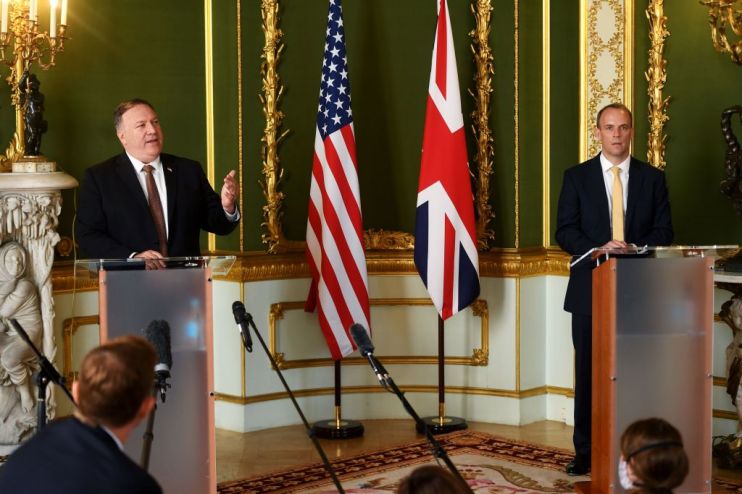Pompeo and Circumstance: The special relationship endures

The visit of a US secretary of state to any country is always an eagerly anticipated affair.
Short of a US presidential visit, there is little that can match the arrival of the global superpower’s leading diplomat onto any domestic stage, as can be testified by the extreme media and political interest these encounters provide.
When there have been concerns about the host nation’s relations with the US prior to a secretarial visit, the tension is magnified. In such cases, much speculation arises around whether the secretary of state will arrive with a bouquet to smooth over ruffled feathers, or a brickbat to lob at those the US thinks need further admonishing to change a particular policy.
So it was that when Mike Pompeo visited the UK earlier this week, many held their breath, fearing the worst.
Britain had, after all, spent much of the previous year attempting to deflect US concerns over the inclusion of the Chinese company Huawei in our 5G communications network, sparking a visceral reaction from a Washington perplexed by British intransigence in the face of obvious national security concerns.
Progress on the eagerly anticipated UK-US free trade deal had seemingly stalled in the face of coronavirus disruption, and the two old allies were not seeing eye to eye on a whole range of other issues. Whether it was World Health Organisation membership, the remnants of the Iran nuclear deal, or the tragic case of Harry Dunn — the British teenager killed on UK soil in a road accident by the wife of an American diplomat who the US has refused to extradite — discord rather than unity appeared to be the order of the day.
Fortunately, what might have proved a sticky visit had it occurred even a couple of weeks earlier in the year turned out to be a pleasant exchange of views for both sides.
In part this reflected a significant recent change in UK policy on Huawei, with security finally taking precedence over commerce with last week’s decision to essentially ban the company from participation in our critical infrastructure. Obviously, this dramatic about-face on an issue of critical importance to the US given our long-standing intelligence relationship — which the Americans made clear would have to be revised if there was to be a Chinese presence in our communications — could not but have gone down well with Washington.
But two other factors stand out for their importance in the renewed spirit of positivity between the nations.
The first may yet prove to be short-lived on account of the US electoral cycle, but remains significant: Pompeo himself.
US secretaries of state often arrive with the accompanying razzmatazz of Air Force One and extensive motorcades flanked with legions of police outriders. But it would be fair to say that some previous incumbents have proven underwhelming in person.
Not so Mike Pompeo. A big bear of a man, he carries himself with the confidence of someone who does not simply project US power overseas, but is comfortable with its use. In part, this reflects a varied career that took in West Point — where he graduated top of his class — prior to stints as a US army officer, a businessman, a congressman, and director of the Central Intelligence Agency.
The last two have proven a boon to his current role. Unlike some secretaries who have come from more esoteric backgrounds, Pompeo clearly understands people and how to communicate with them as only a retail politician would. He is also aware of the value that the US intelligence apparatus can bring to any conversation with another state, and is not shy of sharing it. As a consequence, he has enjoyed warm personal relations with both the British foreign secretaries he has overlapped with, Jeremy Hunt and Dominic Raab.
But even accomplished statesfolk will fail in bridging divides if there is not an essential confluence of interests between the two nations concerned. And the clinching factor in the ongoing success of our “special relationship” is of course just this factor.
For all the occasional bumps in the road, the narrative of UK-US relations in the past few decades has been one of broad agreement about the main problems in the world, how best to confront them and the centrality of UK-US leadership in moving forwards to dealing with them.
While the UK volte face on Huawei may have proven helpful to this particular visit, far more important is the broader shift in UK-China policy that it reflects, and which is now shared by all our major political parties. With the ongoing crisis in Hong Kong occasioned by China’s crackdown on freedoms, the economic threats China is liberally sprinkling around, and the increasing understanding of the human rights abuses being conducted against the Uighur Muslims in Xinjiang Province, the UK has recognised that far from being a benign trading partner, China is increasingly acting as a local and global menace that needs countering.
This sovereign realisation has had a happy coincidence. It has returned the UK to our historic leadership position within the free world, standing side by side with our American allies.
Secretary Pompeo may well be able to reflect on his way home from Europe on a job well done. But it takes two to tango. And the British government will justly share the praise for its part in reinvigorating the special relationship for the benefit of both our peoples.
Main image credit: Getty